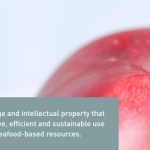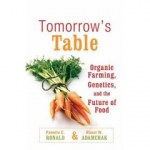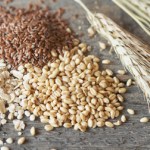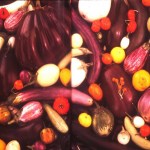agricultual policy
I walked into the gleaming 'Orchard in a box", a closed greenhouse where no pollen can flow outside. The apple was red, red, red inside and out and I wanted it. But because I was in New Zealand, where experimenting with genetically engineered food is highly regulated, tasting was banned.
How was this forbidden fruit created? By overexpression of an apple transcription factor in the white-fleshed, tasty Royal Gala variety. The transcription factor was isolated from an apple that has both red flesh and red skin, that occurs in Central Asia. However, these apples are normally quite bitter…
On Monday afternoon, yours truly will appear with Dr. Oz, "America's doctor," (the tag bestowed on him by no less than Oprah Winfrey) before a live audience in New York City. Although I have never seen the show, a New York Times magazine article written by the brilliant Frank Bruni, suggests that the show, and Dr. Oz himself, are both pretty entertaining.
As one of the most accomplished cardiothoracic surgeons of his generation, Mehmet Oz has transplanted lungs and repurposed hearts; implanted mechanical devices to provide the pump and pulse for patients that cannot manage that on their own;…
One more day to vote in the , which asks the question "Is Biotechnology compatible with sustainable agriculture?"
PZ Myers answers the question this way: "this is weird: agriculture is biotechnology, and just breaking ground with a sharp stick and throwing some seeds in is an example of an 'unnatural' human practice"
He also publishes the opposition's "top secret email", which has some gobbledy-gook about how farmers are turning against GE crops (um, name one?) and contaminating nature (massive reductions in insecticide use on BT cotton fields and enhanced biodiversity is destruction?). PZ…
The most devastating impact on biodiversity is caused by agriculture. Farming is already the greatest extinction threat to birds, and its adverse impacts look set to increase, especially in developing countries (Green et al. 2005).
Thus one of the global challenges for the next century is the need to develop high-yielding varieties that require minimal inputs, so that impacts on biodiversity can be minimized.
An alternative to the "high-input" approach is to expand the number of organic
farms. Because organic farmers do not use synthetic pesticides, their farms support
higher levels of…
Bill Gates had a lot of thoughtful things to say about technology and social innovation at the recent Techonomy conference, including a nice plug for Tomorrow's Table!
"There's a lot of great thinking [from both the GMO and organic communities], which lead to things you should care about-preserving the environments and feeding people with a decent diet."
Video:
Reinventing Capitalism: How to jumpstart what the marketplace can't
Speaker: Bill Gates, Bill & Melinda Gates Foundation Interviewed by Brent Schlender
http://link.brightcove.com/services/player/bcpid87735931001?bclid=87675…
The…
How do you help people who live on less than a dollar a day?
This is one of the challenges that the Bill and Melinda Gates Foundation is taking on. In preparation for a recent visit there, Raoul and I reread a speech that Bill Gates gave at the 2009 world food prize symposium
It is worth a read.
He points out that three-quarters of the world's poorest people get their food and income by farming small plots of land. So if we can make small-holder farming more productive and more profitable, we can have a massive impact on hunger and nutrition and poverty.
If we are successful, we can also…
Some thoughtful and interesting letters in response to the OpEd that James McWilliams and I wrote recently for the NY Times. Here are some highlights:
I think that there are many in the organic food movement who recognize that genetic engineering has a role to play in the future of food. But concerns about what it should be, and who should be making that decision, are valid. I am all for nonprofit groups and university researchers working to alleviate starvation in the third world. I trust their motivations and scientific integrity. I have no such faith in agribusiness.
Traditional small…
The number of people on Earth is expected to shoot up from the current 6.7 billion to 9.2 billion by 2050. How will we feed them? If we continue with current farming practices, vast amounts of wilderness will be lost, millions of birds and billions of insects will die, and farm workers will be exposed to more and more chemicals. And still, we will not have enough food. Clearly, there must be a better way.
Some scientists and policymakers suggest that genetic engineering, a modern form of crop modification, will dramatically reduce our dependence on pesticides, enhance the health of our…
This Op-Ed just published today in the NY TImes.
Here it is with links and a few edits.
A REPORT by the National Research Council last month gave ammunition to both sides in the debate over the cultivation of genetically engineered crops. More than 80 percent of the corn, soybeans and cotton grown in the United States is genetically engineered, and the report details the "long and impressive list of benefits" that has come from these crops, including improved soil quality, reduced erosion and reduced insecticide use.
It also confirmed predictions that widespread cultivation of these crops…
There is little doubt that organic farmers have been instrumental in bringing the need for ecologically based agriculture to the public's attention. That is a good start. We now need to move beyond organic (still only ca 2% of US agriculture) and embrace other tools and farming practices that can help shift current agricultural systems towards enhanced sustainability.
The need is dire.
1 billion people are malnourished, 300,000 people continue to die each year from pesticide-related poisonings, farming on ecologically sensitive land is expanding, the water needed to sustain farming dwindles…
Tonight's dessert is plum cake:
Tante Lissy's Flaumen Kuchen (Plum Cake)
1 c Butter
1 c Sugar
1 Egg
2 tsp Almond extract (or vanilla)
1 tsp Salt
1 c White fl our
1 c Barley
10 Plums, pitted and cut in half
2 Tbsp warmed apricot jam
1. Beat together butter and sugar. Add in egg, almond or vanilla extract,
and salt.
2. Mix in fl our and barley to form a dough.
3. Pat 2/3 of the dough into an ï¸-inch pan with removable rim. Arrange plums,
cut side down, in pan.
4. Lattice rest of dough on top; drizzle with apricot jam.
5. Bake at 350°F for 45 minutes.
I saved some Santa Rosa plums last summer…
For Earth Day, let's celebrate Stewart Brand, the distinguished writer, lecturer and author of the classic Whole Earth Catalog, which won the national book award in 1972.
He also has a new book called "Whole Earth Discipline" where he argues that the established Green agenda is outdated, too negative, too tradition bound, too specialized, too politically one-sided to address the scale of environmental problems that we face today.
You might want to check out John Tierney's column.
"[Stewart Brand] was the one, after all, who helped inspire Earth Day by putting the first picture of the planet…
For a short 5 minute tour of Bill Gates tackling the controversy of GE crops, please see the blog ERV. Thanks for the plug ERV
If you have 45 minutes, watch the entire video here. Bill is serious, sincere and a good speaker with important concepts to convey:
The video starts about 11 minutes in.
> WASHINGTON- (AP) The leader of the United States Department of
> Agriculture's National Institute for Food Research, Dr. Roger Beachy,
> admitted that the release of last week's request for proposals (RFP)
> from scientific researchers was "simply a gag to lighten the research
> funding environment" and that the real one will be released this week.
>
> "Researchers are too stressed out; it seems that all they do is write
> grants. The request for proposals to address extremely finite subject
> areas would alienate 95% of them and give them all an opportunity…
A few years ago, next to a small barn converted into a winery, I noticed a flyer asking voters to support Measure M, an initiative in Sonoma county that sought to " prohibit the raising, growing, propagation, cultivation, sale, or distribution of most genetically engineered organisms."
It pictured the destruction in New Orleans wrought by Hurricane Katrina and the bewildered gaze of George W. Bush. The flyer proclaimed "Who do you trust with your family's health and safety? When FEMA failed, more than a million Americans suffered."
That flyer was typical of the misinformation about GE crops,…
Thank you Bill Gates for your work on behalf of farmers and.... for blogging on our book, Tomorrow's Table!
If you don't have time to read the full reviews, here are a few excerpts:
"This is an important book for anyone who wants to learn about the science of seeds and the challenges faced by farmers... I think anyone who reads this book will be convinced of the authors' sincerity and intelligence - even if, like me, you never try any of the cool-sounding recipes...
I gained an understanding of the history of organic farming and learned about some of the very clever ways organic farmers…
Eggplants are found in many colors: green, white, purple, yellow, even striped. They are shaped like cucumbers or apples. They are eaten in Italy as melanzane alla parmigiana, in France as ratatouille, and in the Middle East as baba ghanoush.
My husband Raoul usually grows Imperial Black Beauty, Rosa Bianca, and the hybrids Beatrice and Nadia. We cook them shortly after harvest:
Spicy Eggplant
2 Eggplants, diced into 1/2" cubes
3 tbsp Olive oil
1 Clove of garlic, smashed and chopped
1/2 tsp Chile flakes
1. Sauté smashed and chopped clove of garlic in the olive oil.
2. Add the chile flakes…
I hear it is snowing in 49 out of 50 states today. And this, just after the big snow in Washington. Is climate change to blame?
According to climate scientists, we cannot extrapolate based on the events of 1 week.
Still, even if we choose to discount the dramatic weather of this week, it is increasingly clear that the climate is changing and that we must rethink agriculture.
Population experts anticipate the addition of another roughly 3 billion people to the planet's population by mid-21st century. However, the amount of arable land has not changed appreciably in more than half a…
Read Emily Waltz' interview with Roger Beachy, the new director for the National Institute of Food and Agriculture (NIFA), the new research funding arm of the US Department of Agriculture (USDA).
What does Beachy's appoinment mean for researchers, farmers and consumers?
Larger, longer grants with more money for education or extension, so the knowledge can reach from the lab to the food to the fork; a stonger focus on sustinable approaches; and a regulatory stucture that is science based
We need to build enhanced capacity in the US to address urgent agricultural challenges such as sustainable…








